- Home
- L. Ron Hubbard
Mission Earth Volume 1: The Invaders Plan Page 4
Mission Earth Volume 1: The Invaders Plan Read online
Page 4
I suddenly held my breath, wondering if Heller would notice: the “orderly” was walking like no spaceman ever walks; he was not sliding along with the easy float that stamps the people of the Fleet. And then something else: that confounded criminal from the Knife Section was wearing his duty belt upside down! The rings from which crew hang equipment and to which they snap safety lines were at the top of the wide red belt, not the bottom. I also caught a flicker of movement from the guards hidden in the dark shrubs and the faintest click of a weapon bolt. My eyes riveted on Heller’s back. Had he noticed?
Heller gave no advance warning. He didn’t stop and stare or look down at the envelope he held. He gave no intake of breath to alert anyone that he was tensing his muscles. He didn’t even change his smile. He exploded!
So quick I couldn’t follow it, both of Heller’s feet were in the air and striking!
The bogus orderly hit the pavement like a shot-down plane.
Heller leaped at him, ready to seize the imposter.
We saw then where the Knife Section got its name. The fellow had barely hit the ground when his hand flashed to the back of his neck. A ten-inch shaft of steel caught light.
He rolled to stab!
The toe of Heller’s foot connected with the orderly’s wrist. I heard the bone snap. The knife went spinning up toward the floodlights.
The shrubs burst into life. With sizzling cracks, five electric whips snapped out. They writhed in arcs of green fire. They coiled around Heller, pinning his arms and legs, jolting him upright.
How he managed to turn, I don’t know. An electric whip is like a strangling rope and I had never before seen a man able to move with one on him, much less five.
Heller twisted himself to get back to the door.
But Lombar was there. He was holding a paralysis dagger, upraised.
Lombar struck!
The deadly shaft plunged into Heller’s shoulder. He started to fall. But even then he was not out. His face was turned to Lombar and there was recognition in his eyes just before they snapped shut.
Like efficient ghosts, guardsmen went into action. A black blanket fluttered down and covered Heller. The electric whip beams were turned off. Like pallbearers conducting a funeral at triple speed they bore their burden off.
Lombar made a hasty check of the scene. There was no unwanted witness in sight. The Knife Section fellow was sitting there, groaning, holding his wrist. Lombar recovered the steel shaft from the shrubs and kicked the fellow to his feet.
I picked up the envelope that had dropped and put it in my blouse.
We faded away from the club.
Under the shoulder of the mountain we loaded up the lorries.
Lombar held a hasty conference with a guard captain. “Get him into an aircar and take him to Spiteos. The orders are: deepest cell, electric wire cage, no communication with anyone. Until I say so, he no longer exists. Got that?”
The guard captain emphatically did and Lombar released his tunic lapels and snapped the stinger. Then the lorries were gone.
We got into Lombar’s tank. The Apparatus Chief snapped the driver on the back of the head with the stinger to start him off and then turned to me.
“Why can’t you take care of things like this?” said Lombar. “If you’d been doing your job, none of this would have had to happen. Can’t you ever learn anything?”
I knew the folly of trying to find out what I was supposed to learn.
But he wasn’t as savage as he had been. The evening’s work had given him a lift. He merely sounded annoyed and put upon.
“You see what you’ve done,” Lombar said as the tank rumbled along. “Now we’ve got to spend the rest of the night ransacking government offices to find the original of that report before it can get up to levels that matter.” And he was on the radio to order out, by coded numbers, a small group of the Shadow Section that takes care of burglaries. And he added the code letters that told them to be prepared to work until dawn.
But we didn’t work just until dawn. We worked around the clock, the entire Empire holiday. For two days and three nights we jimmied windows and picked locks on doors and cracked the combinations of the most secret vaults in the whole vast expanse of Government City while avoiding guards, changing from costume to costume and vehicle to vehicle to appear as janitors, emergency construction workers, bored clerks, city police and even, once, the mistress of a high official who had “forgotten her handbag.” But we did not find the missing report. We did not even find a logging or a copy of it.
Finally as the next government working day began in the green dawn, Lombar Hisst sat red-eyed, slumping with exhaustion and defeat in the animal cave he called his office.
“It must have gone straight to the Grand Council,” Lombar muttered to himself more than to me. “Maybe it even went to the Emperor himself. This is bad.”
He sat awhile, silent. I still did not dare to ask anything.
“I feel it in my gut it will be taken up at the next meeting of the Grand Council,” he muttered at length.
Lombar slumped for minutes, shaking his head. “It will upset their Invasion Timetable. Yes, I’m sure they will think that.”
After a long time he roused himself. “Well, we’ve got to prepare ourselves. I’ll put the screws on Endow,* my lordly and asinine superior. Yes, that’s what I’ll do. Sometimes the Lord of the Exterior has his uses. I don’t think I’ll have to bring up his last private meeting with that pretty spaceman. No, it won’t take that. But I’ll have it ready. I put the photographs someplace.”
He got up to find them and did so. But his moving around had brought me to his attention again.
With sudden ferocity, he snarled, “You’re going to that meeting too! Do you realize, (bleep) you, that you may have upset the whole thing?”
I was tired enough to be incautious. I was also tired of not knowing what this was all about. I managed to speak. “Could you please tell me what’s happening?”
That did it. He loomed over me. He was shouting.
“They’ll read that report! They’ll be certain their Invasion Timetable has been upset! Two years ago I told you to be alert and to block and change every report the Patrol Service turned in on Blito-P3. Earth, you idiot, Earth!”
He grabbed me by the tunic lapels and lifted me out of the chair. He was really shouting now. “You let one get through!”
He was shaking me so hard the room blurred.
“You have threatened our timetable! To Hells with theirs! You’ve probably wrecked the entire basic plan of the Apparatus! You’re going to suffer for this!”
And he hit me across the face with the stinger. Yes, I understood now. We of the Apparatus were in trouble. And particularly Lombar Hisst!
________
*The name has been changed. There was never an Endow on the Grand Council. The so-called Apparatus was not under the Exterior Division. —PUBLISHERS
PART ONE
Chapter 6
It was three nervous days before the Grand Council met and Lombar Hisst made us suffer every moment of it. From minute to minute the Apparatus Central Staff did not know if they would be tortured, shot, or tortured and shot. Nor whether it would be done by Lombar Hisst now or the Imperial Government later.
The Chief Executive of the Coordinated Information Apparatus would go into hours of gloom and then suddenly burst out of it like a rocket and tear people apart or rush off to have another interview with Endow, Lord of the Exterior.
Endow even came personally to the office once. I had seen him from a distance but up close I was very unimpressed. He was in his dotage and always had a nurse with him to mop the slobbers from his chin. He was only about half Lombar’s size and very fat. He could be very clear for a bit but then he would drift off and vaporize, completely out of it. He had been chosen for his post as a remote relation of the late Emperor’s third wife and had been retained when Cling the Lofty had ascended the throne. Endow’s appetite for pretty young men was no
torious and he was generally regarded with disguised contempt. I can say this now that I am out of his reach. Only Lombar’s desires and organization kept Endow in power. On this visit, he pottered around the office while Lombar bullied him. I almost felt sorry for the old man when Lombar showed him some photos of recent executions. The old fellow almost fainted and I wondered what he would have done if Lombar had produced the latest pictures of his peccadillos with the pretty young spaceman. But he promised he would do his part and remember his lines.
At last the day of the Grand Council meeting arrived. We set out well before dawn, Endow and his nurse, Lombar, two Apparatus clerks and myself in Endow’s air-limousine.
Now I know you may find this hard to believe, but I had never before been to Palace City. The Academy Cadet Corps goes there every year to march in review. The newest class members are always introduced to the Emperor—if you can call standing in a group of ten thousand before the throne “being introduced.” But it just happened, not from any design, that each time that day had come around, I was doing punishment drill for low grades and was not included.
Palace City makes a lot of people nervous. Today I found it impressive enough with its circular buildings, its circular parks, its circular walls, everything seven times as big as life. I have heard that it was once the capital city of the race overthrown by the Voltar invasion so long ago but has been so improved, one would never find traces of it: I think the original city was simply crushed to rubble and cleared away. Some find the hugeness of the place overwhelming and others say the glittering gold walls are hard on the eyes. But none of that was what made me sweat: it was the time shift.
Anyone with a lot of space travel behind them gets nervous about anything to do with a black hole. If you ever got too close to one, that would be it. The consequent warping of space, as you know, causes a time shift.
Undoubtedly it was a wise and clever thing, but early Voltar engineers moved a very small nuclear black hole into the mountain behind Palace City as a power source and defense mechanism. This is fine: it gives Palace City an unlimited supply of thermonuclear energy to run its vast complex of machines and devices. For defense, the usefulness cannot be overstated: space-time distortion takes the whole of Palace City thirteen minutes into the future and any invader would find no target, nothing whatever to shoot at.
All this may make things very defense-safe but even a small black hole, when it finally expends, can blow up with a violence that levels mountains. They say it takes them a billion years or more before they go “bang” and that the one at Palace City is perfectly safe and has a long time to run yet. But how do they know how old it already was when they installed it? And if it’s so safe, why did they build Palace City so far away from centers of population? I don’t know how the Emperor stands it, frankly. They say, “The head that wears a crown has nightmares,” and living that close to even a small black hole would not just give me nightmares, I wouldn’t be able to sleep at all.
The time shift, I find, is not just hard on your watch. Personally, I get a bad feeling in my bones every time I’m around a time shift.
This morning, I was already feeling awful, nervous about what might come out in the meeting. And it wasn’t helped any by a near collision at the time barrier as we went in. I’d heard accidents had happened with outgoing traffic, suddenly shifted down in time, hitting head-on with incoming flight traffic moving up in time at the entrances. And this morning—it was still dark on our side—a big Imperial delivery ship, probably going out to markets, abruptly materialized dead ahead and Endow’s pilot, almost as senile as Endow, reacted late and we got hit with air-wash—a near thing.
So when we finally got landed in the circular air-park, I was so shaky I could hardly make it up the spiral staircases to the Grand Council hall. I am telling you this because there were some things I may have missed in the meeting.
I was half blinded by the flashing light on helmets and ceremonial axes, gold and jeweled tablecloths, diamond-studded banners and moving colored lights of the huge circular Council room, and the reflective clothing of the Lords of State and their retinues didn’t help. A splendid portrait of Cling the Lofty and his two sons, now dead, glared down.
The circular conference table was over a hundred feet in diameter, split at the head of the room where, on a high dais, the Viceregal Chairman of the Crown sat. Over thirty Lords of Divisions were already seated at their places, attendants strung out behind them. Endow pottered up to his position and sat down. His nurse stood to his right, Lombar sat on a stool just behind him to his left, where he could get to the old Lord’s ear, and I stood back of them with a couple of clerks. We of the Exterior Division were not too well turned out as a group and I felt shabby, confronted with all that imposing hall.
Trumpets blasted out a fanfare and almost caved my ears in. The Viceregal Chairman of the Crown lifted a jeweled finger and cymbals crashed and made my ears hurt worse. The bimonthly meeting of the Grand Council was in progress.
I was sick in more ways than one. I half expected his opening words would be “Secondary Executive Soltan Gris is dismissed as Section Chief of 451 and is ordered held for trial on the charge of kidnapping a Royal officer, Jettero Heller to wit . . .” But what the Crown really took up was a tax revolt on the planet Kyle.
They doddered around about the tax revolt and finally ordered the Lord of the Interior and the Royal Army to repress it and double Kyle’s taxes—a very welcome order to them as it meant they could fatten their pockets enormously.
Then there was a squabble about the invasion of some system called Cliteus which was threatening to fall behind schedule. The Division of Propaganda and the Division of Diplomacy were blaming each other for noncooperation in arranging peace terms but they wound up united under an accusation from the Division of the Army which was impatient to withdraw its frontline combat troops and then the whole thing got settled when they extracted a promise from the Division of the Army to stop their looting long enough to permit peace treaties to be signed.
The Crown then wanted a report from the Division of Domestic Police concerning their progress in locating one Prince Mortiiy, rumored to be fomenting a revolt against Cling the Lofty in the Calabar System of the Confederacy. And the Division of Domestic Police gave a long-winded background of said Prince Mortiiy which traced his defection to the Division of Education having chosen the wrong tutors and concluded with a report of the arrest, trial and execution of these tutors. Sick as I was, I still noted that the Division of Domestic Police had not said one word about actually doing anything about Royal Prince Mortiiy and the revolt on Calabar: but the Crown simply tabled the matter for the next meeting. The Apparatus, being composed of criminals, holds the Division of Domestic Police in considerable contempt: it didn’t surprise me that the “bluebottles,” as we called them, couldn’t even run down said Prince Mortiiy in a system where he would stand out like a searchlight. Apparently the Crown didn’t think much of them either. That’s why the Apparatus got so many “extra jobs” to do.
Then they got going on a budget discrepancy and there were loud arguments from half a dozen Lords of Divisions who felt they weren’t getting everything entitled to them.
So far, Lombar Hisst had just sat at Endow’s ear, doing and saying nothing. The Crown had finished with the budget and now picked up a large, official-looking report from the mound in front of him. Lombar whispered something to Endow and gave him a nudge in the back. This was it.
PART ONE
Chapter 7
Lords of the Realm,” said the Crown in a sonorous voice, “we have before us now a very grave matter. It could disarrange and cause us to change our entire Invasion Timetable and revise all our planning for the next century.”
There was an instant hush. All the muttering and murmuring that had gone on throughout the other measures was replaced by a sort of stunned silence.
The Viceregal Chairman paused. He had small black eyes set in a sunken face. Those eyes s
tabbed around the great circular table. He had their attention. Oh, my, yes, he did!
“I know,” he said, “that this has never happened before in all the long and victorious history of Voltar.” He flicked the report with the back of his hand. “But it has happened. We must take decision on this matter today.”
“The Crown, if you please!” It was the Lord of the Army Division. “This is very unusual. The Timetable bequeathed us by our ancestors has heretofore been considered inviolate and has the status of Divine Command. In all respect to the Crown, does His Majesty know that the Grand Council is to take this up?”
The Viceregal Chairman of the Crown glared at him. “Not only is His Majesty aware of it but His Majesty—long live Cling the Lofty—personally ordered that we do so.”
I saw Lombar Hisst shudder. That was about the worst news he had had yet. He lurched forward and whispered in Endow’s ear.
“The Crown, if you please,” quavered Endow. “Surely there is misinformation here. It is a grave step to alter the Invasion Timetable. It would disrupt every Division.”
“I am afraid,” said the Crown, “that the information appears to be accurate. Captain Roke, if you please.”
The King’s Own Astrographer, Captain Tars Roke, came from the curtains behind the dais and stood beside the Crown. He was a very tall, imposing figure, darkly uniformed, scientifically dispassionate. The Crown handed him not only the report but a thick pack of papers and charts with it.
Captain Roke looked over the assemblage. “Your Lordships, under the instructions of His Majesty, I am to brief you concerning this situation. With your permission?”
The Lords shifted about, appearing very concerned. Cries of “Yes” and “Please do” echoed in the hall. I could see Lombar Hisst’s hands, clenching and unclenching in barely restrained fury.
“About four months ago,” said Captain Roke, “the Lord of the Exchequer was working with his Bureau of Resources, Allocations and Plannings. They were correcting forward financial estimates for the coming century—which I must call to your attention will begin for us in another sixteen days—and he found he had inadequate information concerning one of our numerous future targets.

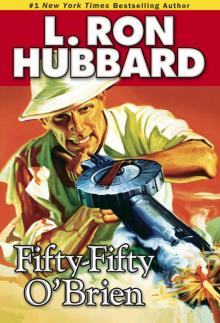 Fifty-Fifty O'Brien
Fifty-Fifty O'Brien Villainy Victorious
Villainy Victorious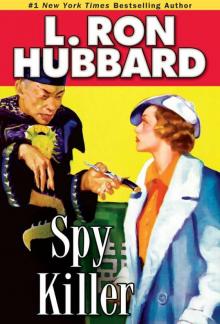 Spy Killer
Spy Killer Ai! Pedrito!: When Intelligence Goes Wrong
Ai! Pedrito!: When Intelligence Goes Wrong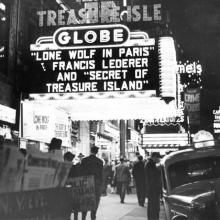 The Dangerous Dimension
The Dangerous Dimension Mission Earth Volume 1: The Invaders Plan
Mission Earth Volume 1: The Invaders Plan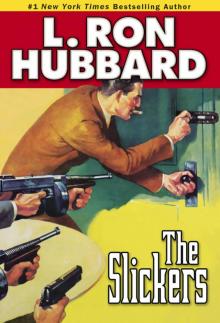 The Slickers
The Slickers If I Were You
If I Were You The Doomed Planet
The Doomed Planet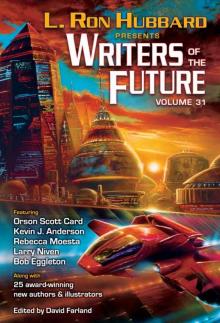 Writers of the Future Volume 31
Writers of the Future Volume 31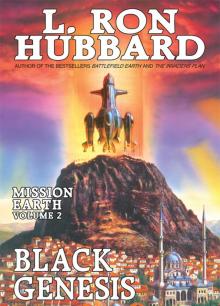 Mission Earth Volume 2: Black Genesis
Mission Earth Volume 2: Black Genesis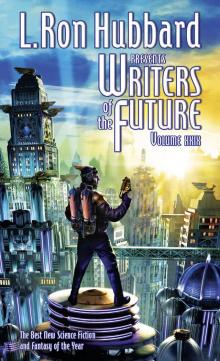 Writers of the Future: 29
Writers of the Future: 29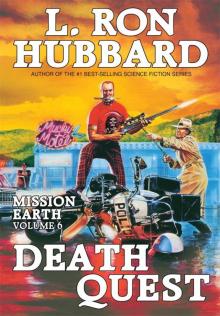 Death Quest
Death Quest The Enemy Within
The Enemy Within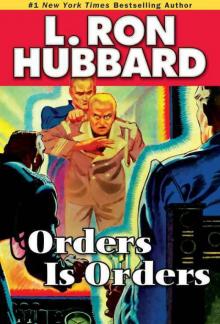 Orders Is Orders
Orders Is Orders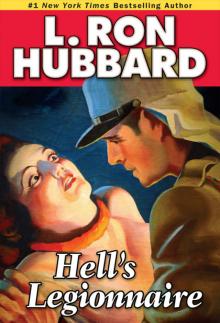 Hell's Legionnaire
Hell's Legionnaire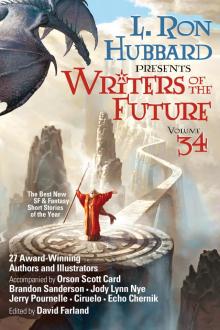 L. Ron Hubbard Presents Writers of the Future 34
L. Ron Hubbard Presents Writers of the Future 34 The Scifi & Fantasy Collection
The Scifi & Fantasy Collection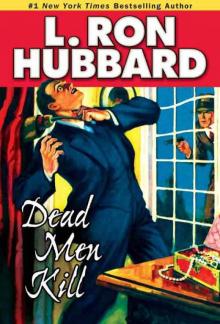 Dead Men Kill
Dead Men Kill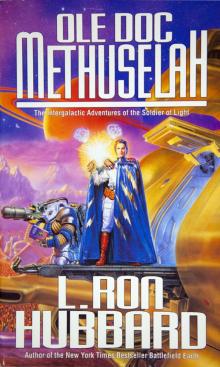 Ole Doc Methuselah: The Intergalactic Adventures of the Soldier of Light
Ole Doc Methuselah: The Intergalactic Adventures of the Soldier of Light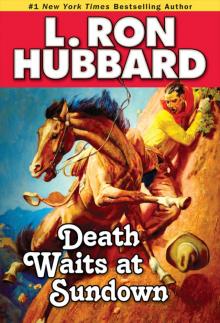 Shadows From Boot Hill
Shadows From Boot Hill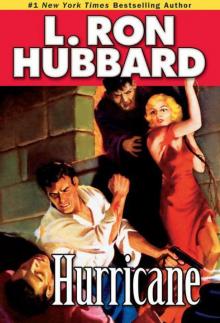 Hurricane
Hurricane Mission Earth Volume 3: The Enemy Within
Mission Earth Volume 3: The Enemy Within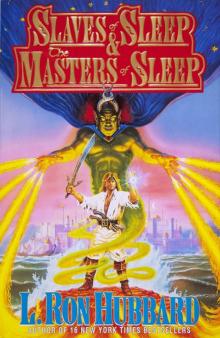 Slaves of Sleep & the Masters of Sleep
Slaves of Sleep & the Masters of Sleep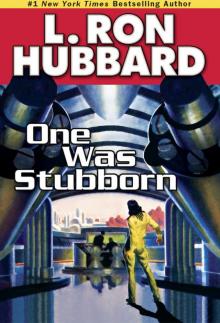 One Was Stubborn
One Was Stubborn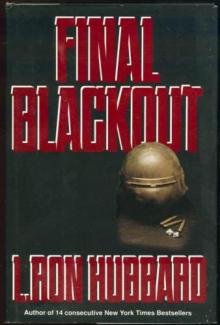 Final Blackout: A Futuristic War Novel
Final Blackout: A Futuristic War Novel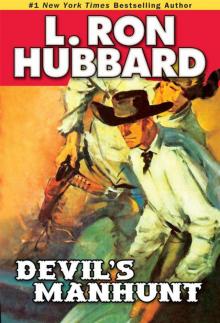 Devil's Manhunt
Devil's Manhunt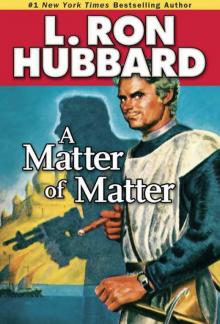 A Matter of Matter
A Matter of Matter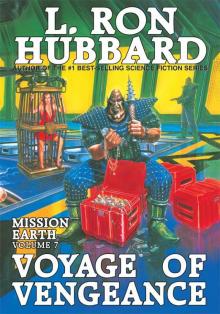 Voyage of Vengeance
Voyage of Vengeance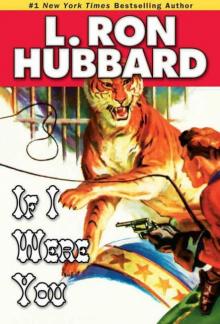 If I Were You (Science Fiction & Fantasy Short Stories Collection)
If I Were You (Science Fiction & Fantasy Short Stories Collection) L. Ron Hubbard Presents Writers of the Future Volume 35
L. Ron Hubbard Presents Writers of the Future Volume 35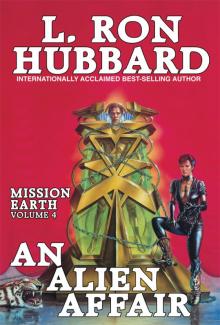 Mission Earth Volume 4: An Alien Affair
Mission Earth Volume 4: An Alien Affair Black Genesis
Black Genesis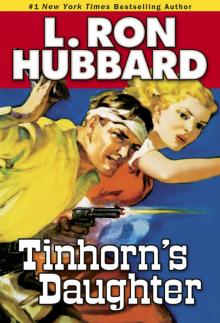 Tinhorn's Daughter
Tinhorn's Daughter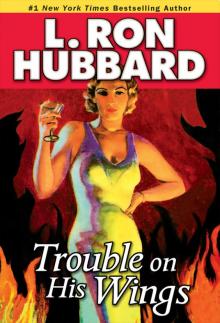 Trouble on His Wings
Trouble on His Wings Writers of the Future Volume 27: The Best New Science Fiction and Fantasy of the Year
Writers of the Future Volume 27: The Best New Science Fiction and Fantasy of the Year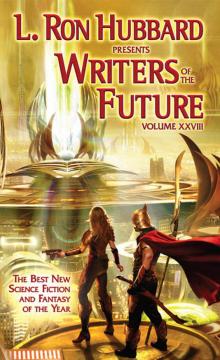 Writers of the Future Volume 28: The Best New Science Fiction and Fantasy of the Year
Writers of the Future Volume 28: The Best New Science Fiction and Fantasy of the Year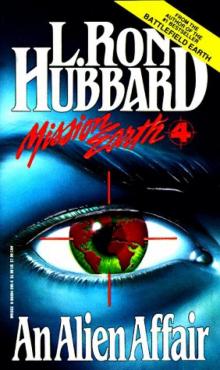 An Alien Affair
An Alien Affair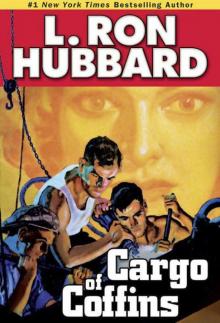 Cargo of Coffins
Cargo of Coffins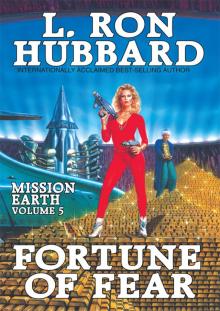 Mission Earth Volume 5: Fortune of Fear
Mission Earth Volume 5: Fortune of Fear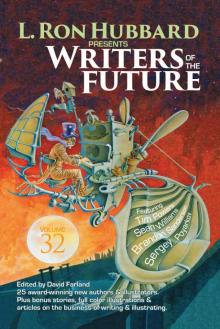 Writers of the Future 32 Science Fiction & Fantasy Anthology
Writers of the Future 32 Science Fiction & Fantasy Anthology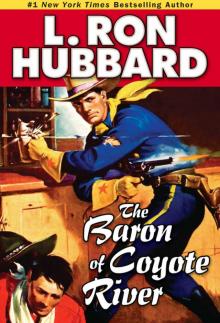 The Baron of Coyote River
The Baron of Coyote River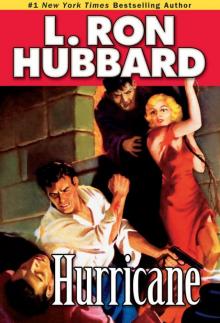 Hurricane (Stories From the Golden Age)
Hurricane (Stories From the Golden Age) Dianetics: The Modern Science of Mental Health
Dianetics: The Modern Science of Mental Health Writers of the Future, Volume 30
Writers of the Future, Volume 30 Battlefield Earth: A Saga of the Year 3000
Battlefield Earth: A Saga of the Year 3000 Fear
Fear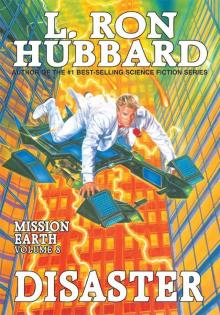 Disaster
Disaster Invaders Plan, The: Mission Earth Volume 1
Invaders Plan, The: Mission Earth Volume 1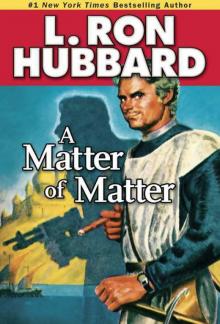 A Matter of Matter (Stories from the Golden Age)
A Matter of Matter (Stories from the Golden Age)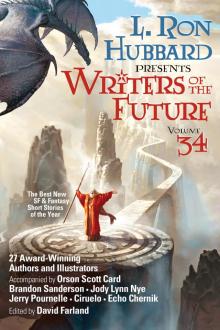 Writers of the Future Volume 34
Writers of the Future Volume 34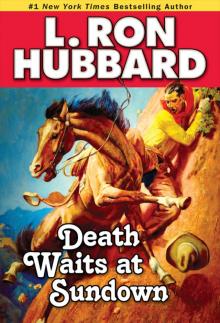 Death Waits at Sundown
Death Waits at Sundown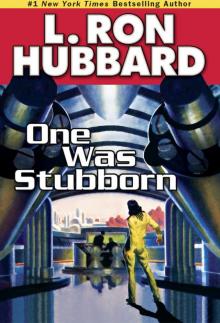 One Was Stubbron
One Was Stubbron If I Were You (Stories from the Golden Age)
If I Were You (Stories from the Golden Age)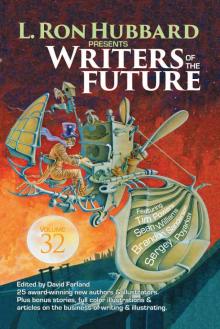 Writers of the Future 32 Science Fiction & Fantasy Anthology (L. Ron Hubbard Presents Writers of the Future)
Writers of the Future 32 Science Fiction & Fantasy Anthology (L. Ron Hubbard Presents Writers of the Future)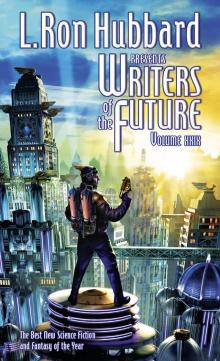 Writers of the Future, Volume 29
Writers of the Future, Volume 29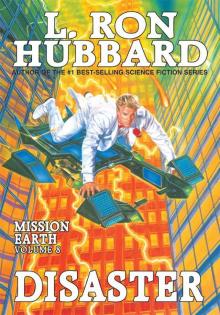 Mission Earth Volume 8: Disaster
Mission Earth Volume 8: Disaster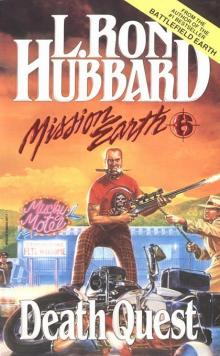 Mission Earth 6: Death Quest
Mission Earth 6: Death Quest Writers of the Future, Volume 27
Writers of the Future, Volume 27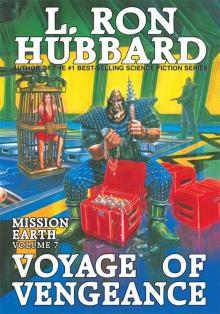 Mission Earth Volume 7: Voyage of Vengeance
Mission Earth Volume 7: Voyage of Vengeance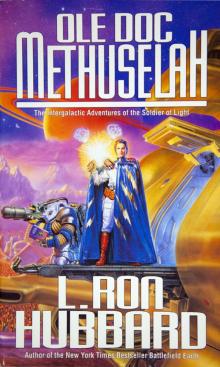 Ole Doc Methuselah
Ole Doc Methuselah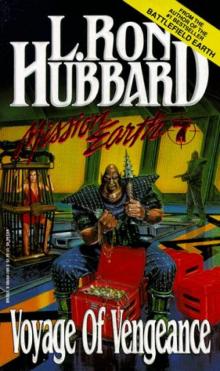 Mission Earth 07: Voyage of Vengeance
Mission Earth 07: Voyage of Vengeance Battlefield Earth
Battlefield Earth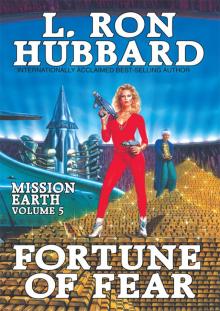 Fortune of Fear
Fortune of Fear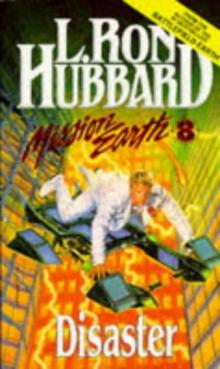 Mission Earth 8: Disaster
Mission Earth 8: Disaster Mission Earth Volume 10: The Doomed Planet
Mission Earth Volume 10: The Doomed Planet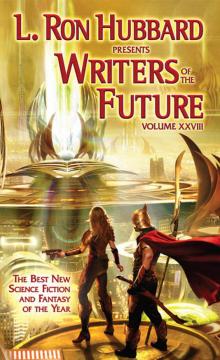 Writers of the Future, Volume 28
Writers of the Future, Volume 28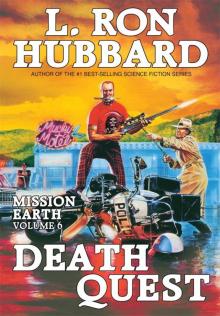 Mission Earth Volume 6: Death Quest
Mission Earth Volume 6: Death Quest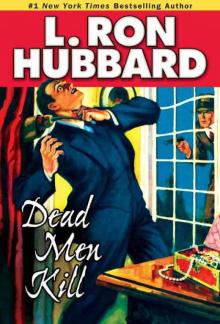 Dead Men Kill (Stories from the Golden Age)
Dead Men Kill (Stories from the Golden Age)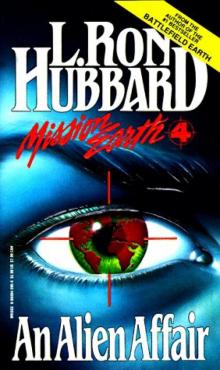 Mission Earth 4: An Alien Affair
Mission Earth 4: An Alien Affair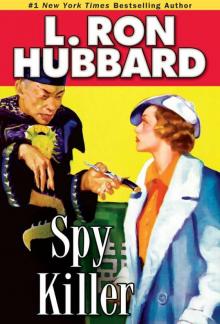 Spy Killer (Stories from the Golden Age)
Spy Killer (Stories from the Golden Age) Mission Earth Volume 9: Villainy Victorious
Mission Earth Volume 9: Villainy Victorious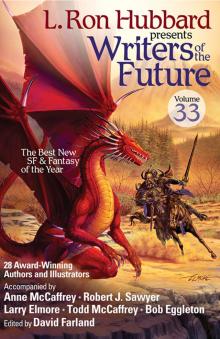 L. Ron Hubbard Presents Writers of the Future, Volume 33
L. Ron Hubbard Presents Writers of the Future, Volume 33